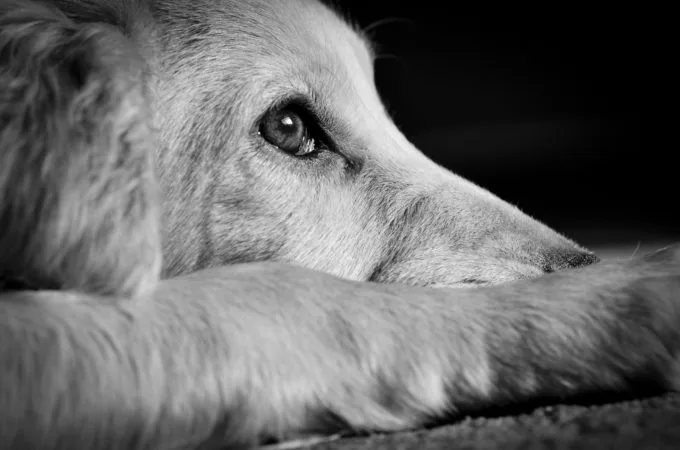There’s nothing quite like waking up first thing in the morning to diarrhea on the kitchen floor. Despite your dog’s best attempts to wake you, a rumbly tummy can lead to indoor accidents even if your dog hasn’t had an accident since puppyhood. Very often, this isn’t a sign of regression, but a symptom of generalized gastrointestinal upset instead.
Canine diarrhea is just as common in pups as it is in humans, and surprisingly, is often spurred on by the very same sources. Your pup eats the wrong food, ingests something they shouldn’t, or picks up a minor bug at doggy daycare.
Most of the issues that lead to diarrhea in dogs are mild and pass quickly, but there are some chronic or serious illnesses that can cause diarrhea, too. This includes canine volvulus (twisted bowel), obstruction/impaction, bloat, and illnesses like parvovirus. If your pup develops sudden diarrhea, see the vet first to rule out conditions like these.
But what if you’ve already seen the vet, and they’ve ruled out serious illnesses? What if your dog experiences the occasional bout of post-snack diarrhea? Answers do exist!
Fast Your Pup (Temporarily)
If your vet clears your dog from serious health issues, and he just seems to struggle with the occasional upset stomach, temporary fasting may help. Start by providing only water for the first six to 12 hours. Then, slowly reintroduce a light, no-salt-added chicken broth. If he tolerates it okay, you can move on to boiled chicken breast and cooked white rice. Give only small amounts at first, slowly adding more on as your dog shows signs of improving.
After a day or two, try your pup on his normal diet again in small amounts. Continue the chicken and white rice, slowly reintegrating his normal diet over the course of a few days.
If at any point your dog shows signs of intolerance to broth, water, chicken, or rice, contact your vet. Resting the stomach almost always works, but repeated regressions may point to canine reflux or acid issues.
Check Your Dog’s Environment
If your dog has diarrhea, it’s best to quickly check his environment for a potential cause. This is especially true if diarrhea occurs out of the blue. Did he get into the garbage? Steal cookies off the table? Eat something from the garden he shouldn’t have?
Even ingesting certain common backyard flowers like buttercups can sometimes produce diarrhea. Buttercup flowers contain a gastrointestinal irritant that isn’t fatal, but certainly can produce diarrhea or vomiting.
Dogs explore the world with their mouths. Keep them safe by continuously puppy-proofing and constantly checking their environment for hazards. Wall off flower gardens, keep them away from puddles that may contain giardia and other bacteria, and provide them with fresh, clean water at all times.
Go Grain-Free
Humans with Celiac disease and grain sensitivities can experience a wide range of symptoms after ingesting grains. Dogs, too, sometimes seem to struggle with grains, though researchers still aren’t clear whether this is due to a true allergy or just a maladapted gastrointestinal system.
Often, the first sign of a grain-related sensitivity is diarrhea or alternating diarrhea and constipation. The easiest way to find out if grain is the culprit is to temporarily remove grains from your dog’s diet.
Choose a high-quality grain-free dog food like Acana, Orijen, or Taste of the Wild if you want to try grain-free. Be wary that sudden food switches may also cause diarrhea; it’s best to switch dog food brands slowly if you can. If your dog continues to experience diarrhea with every meal, and your vet suspects grain to be the cause, he or she may recommend switching all at once instead.
Don’t forget about treats, human foods, and snacks. Many of these contain grains, too, and they could set your dog back once she’s on the road to recovery.
Change Your Food Brand
Dogs are sensitive, especially when it comes to the foods they eat. Even if they aren’t sensitive to grain, they can experience diarrhea due to certain food brand ingredients. As strange as it might seem, beef and eggs are the two most common allergens in dog food, with dairy and chicken making up a close third and fourth.
If your pup experiences chronic diarrhea, try switching to a different brand. It’s often best to go with a single-protein food when starting out because determining the trigger isn’t always easy. Continue to switch food brands once every 21 days (about how long it takes allergens to fully clear the system) until you find something that works.
Most importantly, if you’re using grocery store foods, switch to a better brand. The vast majority of these foods lack high-quality ingredients and are more likely to cause diarrhea.
Try Canned Pure Pumpkin
Some pet owners find pumpkin useful when treating diarrhea at home, especially if it’s mild. Canned pure pumpkin (or boiled and mashed pumpkin at home) contains fibre, a substance your dog requires for firm, healthy stools. It also contains moisture, so it won’t cause constipation like other bulk-forming substances.
Giving pumpkin is most effective when your dog is first starting to eat solid food again. Add just a teaspoon or two to his chicken and rice. Wait to see how he reacts. If diarrhea worsens or he develops constipation, ease back on the amount or stop it completely.
Don’t forget that pure pumpkin isn’t the same as pie filling; one contains sugar and spices, the other contains only pumpkin. As much as your furry friend would love a few tablespoons of pie filling, it isn’t likely to help his diarrhea.
Add Probiotics & Prebiotics
Inside your stomach (and your dog’s stomach) are two types of bacteria: the healthy, beneficial bacteria and the bad, invasive bacteria. In an ideal situation, those bacteria remain in balance and help both of you to stay healthy and digest your food.
But sometimes gut bacteria becomes unbalanced. Antibiotics are notorious for interfering with gut bacteria, and the most common result is, in fact, diarrhea. Upset bacterial balances can also produce gas and incredibly smelly flatulence.
Supplementation with prebiotics and probiotics is ideal for pups with stomach upset, especially if they’ve taken antibiotics in the last three to six months. Exactly which version you should use depends largely on your dog’s unique situation; your vet can identify the best brand for her needs.
Don’t have access to probiotics? A tablespoon of plain probiotic yogurt now and again can help. Just be cautious of dairy allergies and reactions; it’s best to use a lactose-free yogurt if your pup’s sensitive to dairy.
Whether it’s your dog’s first or 40th time experiencing diarrhea, seeing a vet to rule out more complex conditions is always best. The fixes listed above are remarkably effective, but they shouldn’t replace a vet’s advice or care. Your pup looks to you to keep him safe, healthy, and happy — feed him right and address health issues promptly to enjoy a long, healthy life together.

